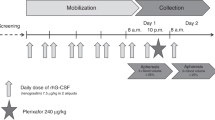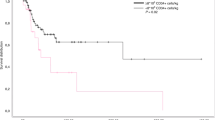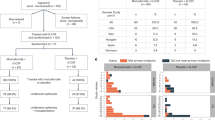Summary:
The engraftment syndrome (ES) is a phenomenon observed in some patients undergoing autologous hematopoietic stem cell transplant (AHSCT). ES is characterized by fever, rash, capillary leak, and pulmonary infiltrates occurring at the onset of engraftment. Prior studies have suggested that the administration of hematopoietic growth factors post-transplant results in the increased frequency of ES. However, the relative contribution of granulocyte colony-stimulating factor (G-CSF) vs granulocyte-macrophage colony-stimulating factor (GM-CSF) to the development of ES remains unknown. A total of 152 consecutive patients who were treated with high-dose chemotherapy and AHSCT supported by either G-CSF or GM-CSF were analyzed retrospectively. In all, 20 patients developed ES, an incidence of 13%. ES was seen more frequently in patients who received GM-CSF (GM-CSF 24% vs G-CSF 4%, p=0.0001). The highest incidence of ES was observed in breast cancer patients (42% of breast cancer patients; 70% of all ES cases). Comparison of the incidence of ES by the priming regimen used comprising either of the growth factors revealed no significant association (p=0.8224). This study demonstrates that the incidence of ES is higher using GM-CSF, particularly in patients with breast cancer. It suggests that it might be advantageous to administer only G-CSF in breast cancer patients undergoing AHSCT to reduce ES-related morbidity.
This is a preview of subscription content, access via your institution
Access options
Subscribe to this journal
Receive 12 print issues and online access
$259.00 per year
only $21.58 per issue
Buy this article
- Purchase on Springer Link
- Instant access to full article PDF
Prices may be subject to local taxes which are calculated during checkout
Similar content being viewed by others
References
Lee C-K, Gingrich RD, Hohl RJ et al. Engraftment syndrome in autologous bone marrow and peripheral stem cell transplantation. Bone Marrow Transplant 1995; 16: 175–182.
Moreb JS, Kubilis PS, Mullins DL et al. Increased frequency of autoaggression syndrome associated with autologous stem cell transplantation in breast cancer patients. Bone Marrow Transplant 1997; 19: 101–106.
Spitzer TR . Engraftment syndrome following hematopoietic stem cell transplantion. Bone Marrow Transplant 2001; 27: 893–898.
Kawano C, Muroi K, Kuribara R et al. Engraftment syndrome after autologous peripheral blood stem cell transplantation with high numbers of peripheral blood stem cells followed by granulocyte colony-stimulating factor adminstration. Bone Marrow Transplant 2000; 25: 228–229.
Ravoet C, Feremans W, Husson B et al. Clinical evidence for an engraftment syndrome associated with early and steep neutrophil recovery after autologous blood stem cell transplantation. Bone Marrow Transplant 1996; 18: 943–947.
Peters WP, Shogan J, Shpall EJ et al. Recombinant human granulocyte-macrophage colony-stimulating factor produces fever. Lancet 1988; 1: 950.
Edenfield WJ, Moores LK, Goodwin G et al. An engraftment syndrome in autologous stem cell transplantion related to mononuclear cell dose. Bone Marrow Transplant 2000; 25: 405–409.
Niiya H, Ogasawara T, Kanda Y et al. Engraftment syndrome after allogeneic hematopoietic stem cell transplantation: a clinically distinct syndrome from aGVHD? Blood 2000; 96 (Suppl. 2) (Abstr. 5229). p 342b.
Kennedy MJ, Jones RJ. Autologous graft-versus-host disease: immunotherapy of breast cancer after bone marrow transplantation. Breast Cancer Res Treatment 1993; 26 (Suppl.): S31–S40.
Colby C, McAfee S, Sackstein R et al. Engraftment syndrome following non-myeloablative conditioning therapy and HLA-matched bone marrow transplantation for hematologic malignancy. Blood 2000; 96: 520a (Abstr. 2238).
Sutkowi L, Pohlman B, Kalaycio M et al. Clinical correlations of the engraftment syndrome. Blood 1999; 94 (Suppl. 1) (Abstr. 639). p 146a.
Khan SA, Gaa B, Pollock BH et al. Engraftment syndrome in breast cancer patients after stem cell transplantation is associated with poor long-term survival. Biol Blood Marrow Transplant 2001; 7: 433–438.
Rabinowitz J, Petros Wp, Stuart AR et al. Characterization of endogenous cytokine concentrations after high dose chemotherapy with autologous bone marrow support. Blood 1993; 81: 2452–2459.
Chasty RC, Lamb WR, Gallati H et al. Serum cutokine levels in patients undergoing bone marrow transplantation. Bone Marrow Transplant 1993; 12: 331–336.
Holler E, Kolb HJ, Moller A et al. Increased levels of tumor necrosis factor alpha precede major complications of bone marrow transplantaion. Blood 1990; 75: 1011–1016.
Young JW, Steinman RM. The hematopoietic development of dendritic cells: a distinct pathway for myeloid differentiation. Stem Cells 1996; 14: 376–387.
Nürnberger W, Willers R, Burdach S et al. Risk factors for capillary leakage syndrome after bone marrow transplantation. Ann Hematol 1997; 74: 221–224.
Acknowledgements
The authors thank Claudia Kabler-Babbitt for her assistance in preparation of the manuscript.
Author information
Authors and Affiliations
Rights and permissions
About this article
Cite this article
Akasheh, M., Eastwood, D. & Vesole, D. Engraftment syndrome after autologous hematopoietic stem cell transplant supported by granulocyte-colony-stimulating factor (G-CSF) versus granulocyte-macrophage colony-stimulating factor (GM-CSF). Bone Marrow Transplant 31, 113–116 (2003). https://doi.org/10.1038/sj.bmt.1703784
Received:
Accepted:
Published:
Issue Date:
DOI: https://doi.org/10.1038/sj.bmt.1703784
Keywords
This article is cited by
-
Improving security of autologous hematopoietic stem cell transplant in patients with light-chain amyloidosis
Bone Marrow Transplantation (2019)
-
Innovative strategies minimize engraftment syndrome in multiple myeloma patients with novel induction therapy following autologous hematopoietic stem cell transplantation
Bone Marrow Transplantation (2018)
-
At-home autologous stem cell transplantation in multiple myeloma with and without G-CSF administration: a comparative study
Bone Marrow Transplantation (2016)
-
Engraftment syndrome: double-edged sword of hematopoietic cell transplants
Bone Marrow Transplantation (2015)
-
Steroids prevent engraftment syndrome after autologous hematopoietic stem cell transplantation without increasing the risk of infection
Bone Marrow Transplantation (2005)



